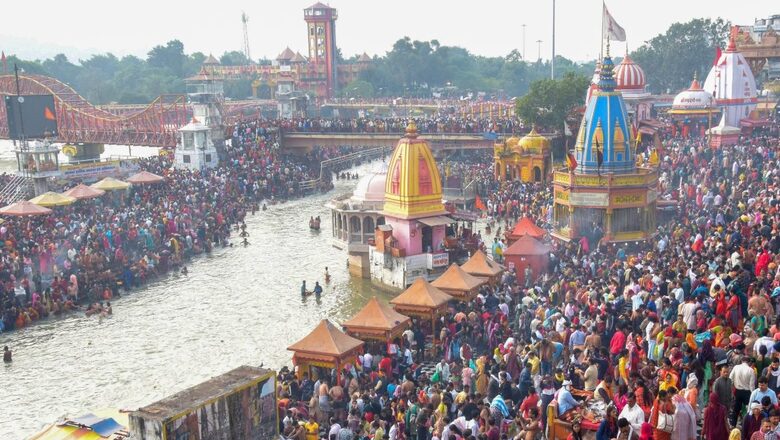
views
Cultural entrepreneurs are the pulse of the global economy. They can stimulate conservation of the eternal heritage with an intent to preserve the legacy, foster community participation, persuade skill development, and empower socio-economic development. In India, cultural entrepreneurship is a substantial prerequisite for the sustainability of the ethos and inheritance of our country.
The cultural factor has always played and is still playing a crucial and revolutionary role in the process of evolution. India has its own unique identity because of its wide diversity. As India dashes towards being the most populated nation, touching the benchmark of 1.4 billion citizens, its population density is 470 people per sq km. With over 700 different tribes in India and every major religion in the world practised in the country, it also hosts 179 languages and 544 documented dialects. The Indian Constitution recognises 22 major languages of India in its 8th Schedule. India is a land of diversity with varied cultures and sub-cultures, comprising 28 states and eight Union Territories. These numbers represent us, our strengths, our diversity, our existence, and our legacy, which has been significantly evident to the world for centuries. Bharat, as depicted in our ancient scriptures, has been a hub of trade since ancient times, and when it comes to trade, our entrepreneurs weren’t just limited to commodities. It was about the culture as well.
In current times, this offers us a stretched stage to perform, invent a wide range of ideas for cultural entrepreneurship, and set the wheels in motion. Cultural entrepreneurship incites the nation’s legacy, resources, heritage, and artistic capacities through innovative products and services. It outlines the nation’s cultural economy, facilitates political economic growth, advances innovation, uplifts social development, and enhances socio-cultural expansion. As India’s strength is its centuries-old heritage, indigenous wisdom and prehistoric practices, we must not overlook its strong potential and leverage our cultural values to push for making India a leading cultural and creative economy in the world.
Culture develops. It evolves with time in its ways of representation. Our craftsmanship, gastronomy, legacy, celebrations, and ceremonies are all absorbed in the progression, and the journey continues. Yet, India is indisputably the only empire that is enormously diverse and has seen a cultural gamut since its formation. One of the significant roots of this has been the spread of shared beliefs and perceptions from generation to generation. For instance, Haridwar has never lost its glory, and it continues to be one of the most vibrant pilgrimage sites owing to its social, historical, geographical, and cultural beliefs and values. This is one of the factors that makes it a popular destination for cultural tourism around the world. Similarly, Varanasi (Banaras) is not only the oldest civilisation in the world but also home to many creative artists, including the world-famous community of artists who weave the finest ‘Banarasi’ sarees for national as well as global consumption.
India is a powerhouse and produces some of the finest-quality handicrafts, textiles, spices, ayurvedic products, etc. India’s diversity and its cultures and sub-cultures have a lot to offer the world. India’s massive and matchless intense heritage exhibits methodical and architectural wisdom, rich political history, a pandora of customs, ancient ecological practices, distinguished aesthetics, and perseverance.
With the recent initiatives by the Government of India, a unique ecosystem is being revived, and now it is evident that India is on its way to becoming self-reliant, matching pace with the global market. Cultural entrepreneurship has an imperative role to play and a valuable contribution to make on this journey. We are creating financially sustainable and internationally competent cultural enterprises. This will not only push the engine of livelihood creation but also set the wheel of national wealth creation in motion. This will not only be instrumental in forming massive familiarity and all-embracing fondness towards India but will also develop a globally competent work culture and ethos that lead to the effectiveness of efforts and resources, thus affirming our soft power.
India, known as Bharat since its evidence is available, has never envisioned enterprises as tools to generate revenue. It has always made efforts to add value to society, ecology, and the universe at large. This value addition is only successful in a real sense if it can only bring about positive changes at the grassroots level, thus making it extremely important to consider the social impact of cultural entrepreneurship on our society. India is a culturally driven country. Apart from this, culture is another soft power that can regulate communities. With the penetration of Indian culture through its various enterprises, we can have a pivotal voice in global communities, swaying their perspectives that are sourced directly from local communities in our country. Concurrently, financing and access to numerous sources of funding must be explored.
While the Government of India is already providing massive aid to foster an entrepreneurial environment in the country, active community participation and a bit more specific attention towards policy-push and research-led initiatives to benefit cultural entrepreneurs would be of huge support. The guardians of Indian cultures and sub-cultures have long struggled to shield our legacy and heritage, and now is the time that we move the needle to emphasise cultural prosperity to ensure the cultural gamut. To attain this, there is a need to harness the economic potential of cultural assets. This is imaginable only through the formation and nourishment of effective cultural enterprises. Therefore, a multistakeholder map and a robust ecosystem must be established to empower our cultural enterprises to upsurge socio-economic independence, which would have better societal impacts, strengthen India’s position on the global map, and connect individuals operating at the ground level in the global market.
Dr Anil Agrawal is Member of Parliament, Rajya Sabha; Dr Jwalant Bhavsar is Assistant Professor, Department of Psychology and Convenor, Institutional Innovation Council, Dev Sanskriti Vishwavidyalaya, Haridwar. Views expressed in the above piece are personal and solely that of the author. They do not necessarily reflect News18’s views.




















Comments
0 comment